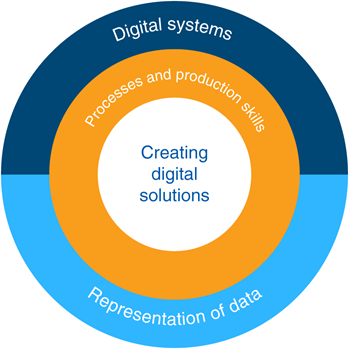Creative Industries (Digital Technology)
 Digital technologies impact on
every aspect of our lives and are vitally important to New Zealand?s growth in
the 21st century.
Information is the basis of governmental, scientific, commercial and industrial
institutions, and of all disciplines of study. Students in New Zealand need opportunities to develop
knowledge and skills with digital technologies so they are equipped to respond
to rapid changes in our society.
Digital technologies impact on
every aspect of our lives and are vitally important to New Zealand?s growth in
the 21st century.
Information is the basis of governmental, scientific, commercial and industrial
institutions, and of all disciplines of study. Students in New Zealand need opportunities to develop
knowledge and skills with digital technologies so they are equipped to respond
to rapid changes in our society.
Digital Technologies are applied in most aspects of modern day human endeavor, at the same time the techniques of digital technology owe their existence to a wide range of disciplines which include business, commerce, linguistics, physics, psychology, communications, engineering and mathematics. Courses in Digital Technologies offer the development of knowledge and skills using a wide range of exciting Internet and computing technologies. The courses are designed to ignite a passion for digital technologies, and to lead students into a rewarding and fulfilling future and further studies.
Digital Technologies Courses include:
Courses in this Learning Area
Accountant, Accounts Officer, Advertising, Auditor, Biomedical Engineer, Business Analyst, Computer Support Technician, Contact Centre Worker, Data Entry Operator/Transcriptionist, Database/Systems Administrator, Electronics Engineer, Energy Auditor, Financial Adviser, Financial Dealer, Game Developer, Helpdesk/Support Technician, Information Technology Architect, Information and Communication Technology Manager, Loss Adjuster, Management Consultant, Manager Marketing, Mortgage Broker, Network Administrator, Network Engineer, Procurement Manager, Production Manager, Programmer, Real Estate Agent, Sales and Marketing, Software Architect, Systems Administrator, Telecommunications Engineer, Tertiary Lecturer, Test Analyst, Web Designer, Web Developer, Website Administrator,
 Liston College
Liston College